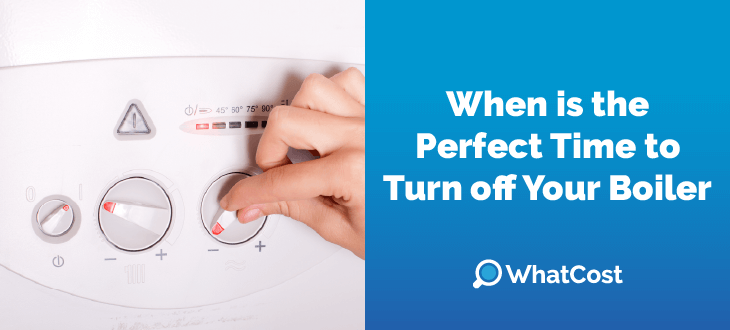- whatcost.co.uk
- Blog
- When Is the Perfect Time to Turn Off Your Boiler?
When Is the Perfect Time to Turn Off Your Boiler?


The UK has now officially entered the season of spring, which should mean better weather and warmer temperatures. So, many are wondering when the best time is to turn off your boiler for a few months.
Now, this depends on a few factors, most importantly, the type of boiler that you have. Those with a modern combi boiler will have to keep it on all year round. However, others have the option to turn off certain functions in order to save money.
Boiler Expert Joshua Houston has revealed more below.
How warm should it be before turning off your heating?
Even though March is here, it will still be chilly for the next few weeks. Spring officially starts on March 20th, so this is a good date to keep in mind for when to reduce your heating use. The ideal climate to turn off your heating is when the outside temperature is 14°C and above (this is usually around March 20th). There’s no exact temperature for you to follow, so if you do feel cold at this temperature, then keep your heating on; this is just a suggestion. But it is deemed warm enough that you should be able to cope with no heating, especially if you have good insulation.
Do I have to worry about my boiler system during the warmer months?
It’s important to remember that even though you might not need your heating during the warmer months, you do need hot water. Another factor that needs to be considered is the potential growth of bacteria in your boiler. If your water temperatures are consistently below 50°C, then this risks bacteria growth. This can lead to blockages and system corrosion, which will require you to hire a professional or replace the boiler altogether. Hiring a professional will cost you between £70 and £150 just for the call-out; any repairs will cost extra. A new boiler (plus installation) is an even bigger hit on your bank account, with the average cost between £700 and £5,000.
Will this save you money?
Using your heating less will ultimately save you money. The average heating bill in winter is between £150 and £160, whereas in spring and summer, this is reduced to £80. Meaning once the spring season is over, you could have an extra £240 in your pocket.
Joshua Houston, Boiler Expert at WhatCost:
‘’We’re all eager to turn off our heating and enjoy warmer weather. But to some, it won’t just be this; it will be a few months of having a little extra income due to the reduction in their heating bill.
But to really save money, you have to make sure that you look after your boiler. Avoid your water temperature falling below 50°C, as this will end up costing you much more in boiler repairs than you would in bill savings.’’

Josh Houston is a writer at WhatCost whose passionate about the world of renewable energy, energy saving solutions and home improvements. He specialises in providing useful tips that our readers can adopt for their own needs. His skills involve translating complex topics to something more understandable.
